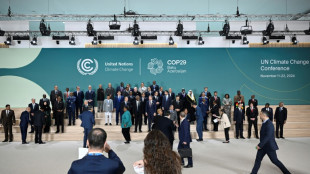
-
 'Puzzle' master Sinner powers champions Italy back into Davis Cup final
'Puzzle' master Sinner powers champions Italy back into Davis Cup final
-
Odegaard inspires Arsenal to reignite title hopes

-
 Marseille down Lens to stay in touch with Ligue 1 leaders
Marseille down Lens to stay in touch with Ligue 1 leaders
-
Novak Djokovic: All-conquering, divisive tennis superstar

-
 Scott Bessent a credible, safe pick for Treasury: experts
Scott Bessent a credible, safe pick for Treasury: experts
-
World approves UN rules for carbon trading between nations at COP29

-
 Putin signs law letting Ukraine fighters write off bad debts
Putin signs law letting Ukraine fighters write off bad debts
-
Thousands march against Angola govt

-
 Ireland coast to victory as they run Fiji ragged
Ireland coast to victory as they run Fiji ragged
-
Atletico make comeback to beat Alaves as Simeone hits milestone

-
 Aid only 'delaying deaths' as Sudan counts down to famine: agency chief
Aid only 'delaying deaths' as Sudan counts down to famine: agency chief
-
Leipzig lose more ground on Bayern with Hoffenheim loss

-
 Arsenal back to winning ways, Chelsea up to third in Premier League
Arsenal back to winning ways, Chelsea up to third in Premier League
-
Sinner powers Davis Cup holders Italy past Australia to final

-
 Andy Murray to coach Novak Djokovic
Andy Murray to coach Novak Djokovic
-
Leipzig lose ground on Bayern, Dortmund and Leverkusen win

-
 Fear in central Beirut district hit by Israeli strikes
Fear in central Beirut district hit by Israeli strikes
-
Chinese film about Covid-19 wins Taiwan's top Golden Horse prizes

-
 Tuipulotu puts anger behind him as he captains Scotland against native Australia
Tuipulotu puts anger behind him as he captains Scotland against native Australia
-
Inter smash Verona to take Serie A lead

-
 Mass rape trial sparks demonstrations across France
Mass rape trial sparks demonstrations across France
-
Lebanon says 15 killed in Israeli strike on central Beirut

-
 Eddie Jones will revel in winding up England - Genge
Eddie Jones will revel in winding up England - Genge
-
Chelsea see off Leicester on Maresca's King Power return

-
 Storms bring chaos to Ireland, France, UK
Storms bring chaos to Ireland, France, UK
-
Berrettini gives Italy edge on Australia in Davis Cup semis

-
 Amber Glenn storms to gold in Cup of China
Amber Glenn storms to gold in Cup of China
-
High-flying Chelsea see off Leicester

-
 Climate-threatened nations stage protest at COP29 over contentious deal
Climate-threatened nations stage protest at COP29 over contentious deal
-
Families fleeing after 32 killed in new sectarian violence in Pakistan

-
 Ancelotti says 'ugly' to speculate about Mbappe mental health
Ancelotti says 'ugly' to speculate about Mbappe mental health
-
Failure haunts UN environment conferences

-
 Colapinto in doubt for Las Vegas GP after crashing
Colapinto in doubt for Las Vegas GP after crashing
-
Lebanon says 11 killed in Israeli strike on central Beirut

-
 Three arrested in Spain for racist abuse at Liga Clasico
Three arrested in Spain for racist abuse at Liga Clasico
-
Pope to skip Notre Dame opening for Corsica visit

-
 Tokyo police care for lost umbrellas, keys, flying squirrels
Tokyo police care for lost umbrellas, keys, flying squirrels
-
Neuville closes in on world title after Rally Japan recovery

-
 Jaiswal slams unbeaten 90 as India seize control against Australia
Jaiswal slams unbeaten 90 as India seize control against Australia
-
'Nice surprise' for Verstappen to edge Norris in Las Vegas GP qualifying

-
 Indian teen admits to 'some nerves' in bid for world chess crown
Indian teen admits to 'some nerves' in bid for world chess crown
-
Patrick Reed shoots rare 59 to make Hong Kong Open history

-
 Record-breaker Kane hits back after England criticism
Record-breaker Kane hits back after England criticism
-
Cameron Smith jumps into lead at Australian PGA Championship

-
 Russell on pole position at Las Vegas GP, Verstappen ahead of Norris
Russell on pole position at Las Vegas GP, Verstappen ahead of Norris
-
Philippine VP made 'active threat' on Marcos' life: palace

-
 Celtics labor to win over Wizards, Warriors into Cup quarters
Celtics labor to win over Wizards, Warriors into Cup quarters
-
Balkans women stage ancient Greek play to condemn women's suffering in war

-
 Nvidia CEO says will balance compliance and tech advances under Trump
Nvidia CEO says will balance compliance and tech advances under Trump
-
Grand Slam ambition dawning for Australia against Scotland


Half of world's glaciers expected to vanish by 2100: study
Half of the Earth's glaciers, notably smaller ones, are destined to disappear by the end of the century because of climate change, but limiting global warming could save others, according to a new study.
The findings, published in the journal Science on Thursday, provide the most comprehensive look so far at the future of the world's 215,000 glaciers.
The authors emphasized the importance of restricting greenhouse gas emissions to limit the consequences from glacier melt such as sea level rise and depletion of water resources.
To help orient policy makers, the study looked at the impact of four scenarios on glaciers, where global mean temperature change is 1.5 degrees Celsius (2.7 degrees Fahrenheit), 2.0C, 3.0C and 4.0C.
"Every degree increase produces more melt and loss," said Regine Hock of the University of Oslo and University of Alaska Fairbanks, a co-author of the study.
"But that also means if you reduce the temperature increase, you can also reduce that mass loss," Hock told AFP. "So in that sense, there is also a little bit of hope."
Even if global temperature rise is limited to 1.5C above pre-industrial levels -- the most ambitious goal of the Paris Agreement -- the researchers estimated that 49 percent of the world's glaciers would vanish by the year 2100.
That would represent about 26 percent of the world's glacier mass because the smallest glaciers would be those first impacted.
Global mean temperature is currently estimated to be increasing by 2.7C which would result in a near-complete loss of glaciers in Central Europe, Western Canada and the continental United States and New Zealand.
"Regions with relatively little ice like the European Alps, the Caucasus, the Andes, or the western US, they lose almost all the ice by the end of the century almost no matter what the emission scenario is," Hock said. "So those glaciers, they're more or less doomed."
- 'Up to the policy makers' -
Under the worst-case scenario -- global temperature rise of 4.0C -- giant glaciers such as those in Alaska would be more affected and 83 percent of glaciers would disappear by the end of the century.
Glacier loss would also exacerbate sea level rise.
"The glaciers that we are studying are only one percent of all ice on Earth," said Hock, "much less than the Greenland ice sheet and the Antarctic ice sheet.
"But they have contributed to sea level rise almost just as much as the Greenland and Antarctic ice sheet together in the last three decades," she said.
Warming of 1.5C would lead to an increase in average sea levels of nine centimeters while temperatures 4.0C higher would cause 15 centimeters of sea level rise.
"It doesn't sound very much, nine centimeters up to 15 centimeters," Hock said, "but it's not global sea level that is that much of a concern.
"It's mostly associated storm surges," she said, which have the potential to cause "a lot more damage."
The disappearance of glaciers will also have an impact on water resources because they provide freshwater for some two billion people.
"The glaciers compensate for the loss of water in summer when it's not raining much and it's hot," Hock said.
The study's projections, which are more pessimistic than those of UN climate experts, were reached through observations of the mass of each glacier through the decades and computer simulations.
Despite the alarming findings, Hock said "it is possible to reduce the mass loss by human action.
"If it happens is of course a different question," she said. "If that happens is of course up to the policy makers."
O.Lorenz--BTB



